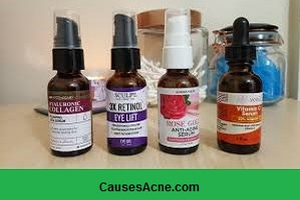
Using Retinol To Treat Acne – Risks and Side Effects
Retinol is a naturally occurring form of vitamin A that is found in both humans and animals and is related to growth, vision and our immune system among others. Retinol is also synthesized and used as a treatment for various skin problems, including acne. It is most commonly used as a topical cream applied to keep skin looking healthy and used in conjunction with other acne treatments. Some forms of it can also be takes orally to treat more sever cases of acne.
As A Treatment For Acne
Retinol can be used daily as a topical cream when treating acne. The use of Retinol speeds up the process of shedding dead skin cells from the outer layers of skin, keeping them from becoming infected and causing blemishes. This ingredient also promotes the growth of new skin cells and stimulates their functioning, leaving skin looking more healthy and pure. As previously mentioned, the medication is most often used in conjunction with another medication, such as a hydroxy acid, which exfoliates and purifies the skin. Retinol can improve the look of your skin by removing blemishes and acne scars.
It has been noted that Retinol is fairly gentle on the skin and, unlike other acne treatments, it rarely leaves skin inflamed or feeling itchy and painful. Topical ointments using Retinol as the active ingredient are gentle on the skin, but they can sometimes require long periods of use before any improvement of acne is noted. In addition to helping to remove acne, Retinol leaves skin looking tighter and feeling softer and this is usually noticeable after a short period of use. While it is less harsh as some other acne treatments, when it is used in conjunction with another treatment, it helps to keep skin looking healthy.
Risks and Side-Effects
Although Retinol is fairly gentle on the skin in comparison to some other acne treatments, there are some possible side effects that can occur with its use. Some patients have found that it can can cause tingling, redness and a slight burning sensation with use, however, these side effects usually occur only with initial use. Another possible side effect is dry, flaky skin and this can be treated with the use of a moisturizer. Similar to other acne treatments, Retinol can cause an increased sensitivity to sunlight and protection from the sun, such as sunscreen, should be used in conjunction with the ointment. The medication should not be used by pregnant women due to the possible risks of birth defect.
